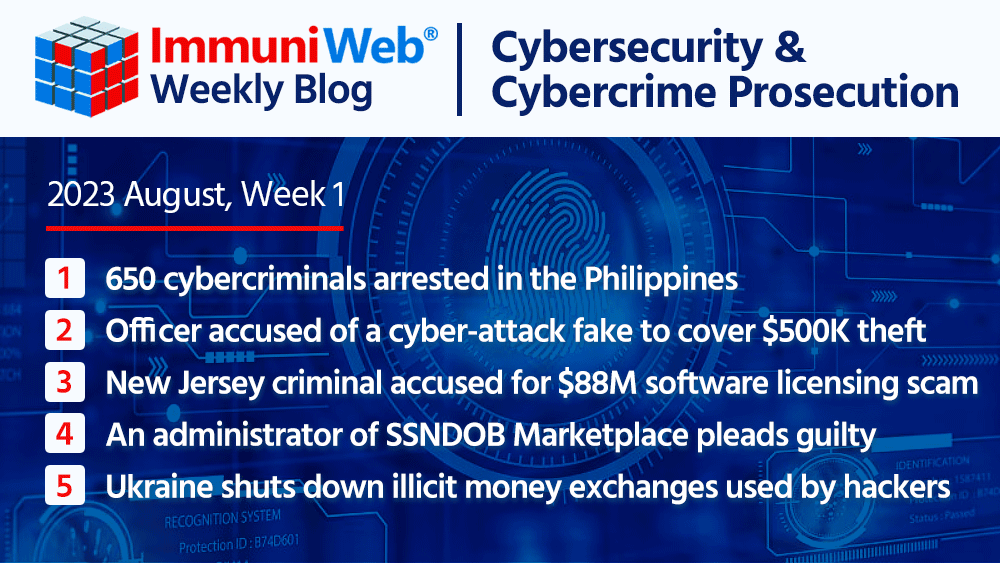650 Cybercriminals Arrested In The Philippines
Read also: Avaya reseller pleads guilty to role in $88M software licensing scam, Ukraine shuts down illicit money exchanges, and more.

650 arrested following a crackdown on cybercriminal hub in the Philippines
The Philippine authorities have apprehended nearly 650 suspects during a raid in an establishment in Pasay City that allegedly operated as a cybercriminal hub running love scams and cryptocurrency scams.
During the searches, the police seized phones, computer equipment, SIM cards, and other devices, as well as alleged scripts for love scams and “devices for text blasts.”
The authorities have yet to identify the leaders of the gang but they suspect the involvement of Chinese nationals. Out of 650 people arrested, over 400 are Filipinos while the rest are Chinese and Indian nationals.
Request your free demo now and talk to our experts.
Former municipality officer accused of faking a cyber-attack to cover $500K theft
A former Chief Administrative Officer (CAO) of the Municipality of Gilbert Plains in western Manitoba, Canada, has been accused of stealing more than a half-million dollars from the municipality and concocting a story of a fake cyber-attack to cover up the theft.
The lawsuit filed against Amber Fisher alleges that between September 2020 and July 2021, she made 33 bank transfers from the municipality’s account to her own, stealing about $532,000 in total. Fisher is also accused of forging bank statements to hide the transfers. Moreover, she made up a tale of being a victim of a cyber-attack and submitted a draft of a fraud report, which cleared her of any wrongdoing.
Amber Fisher is said to have repaid about $17,000 to the municipality, however, she still owes around $515,000. The municipality is suing to retrieve the rest of the funds and for general, special and punitive damages.
Cybersecurity Compliance
Prevent data breaches and meet regulatory requirements


A New Jersey businessman pleads guilty to role in $88M software licensing scam
An operator of a New Jersey-based business communications systems provider and a de-authorized Avaya reseller has pleaded guilty to his role in a massive fraud scheme resulting in the sale of $88 million worth of pirated Avaya software licenses.
According to the authorities, Jason Hines, aka Joe Brown, Chad Johnson, and Justin Albaum, bought unauthorized Avaya Direct International (ADI) software licenses from a man named Brad Pearce, who used his position as a customer service employee at Avaya to generate software keys without authorization, creating tens of thousands of them that he sold to his clients.
Hines is said to have been Pearces’ largest customer, buying over 55% of the stolen licenses. Hines pleaded guilty to conspiracy to commit wire fraud and agreed to forfeit at least $2 million as well as make full restitution to his victims. A sentencing date has yet to be set.
An administrator of SSNDOB Marketplace pleads guilty
An administrator of the now-defunct SSNDOB Marketplace has pleaded guilty in the US court to charges related to the operation of the illicit platform.
SSNDOB operated through a series of websites and was advertised via darkweb criminal forums and was used by cybercriminals to trade stolen personal data. The marketplace was shut down as part of an international law enforcement operation in June 2022.
The defendant, Vitalii Chychasov, was arrested in Hungary in March 2022 and extradited to the US in July of the same year. As part of his plea agreement, Chychasov has agreed to hand over several of the SSNDOB domains, as well as $5 million obtained via illicit activities. He faces a maximum penalty of 15 years in prison.
Ukraine shuts down illicit money exchanges used by hackers
The cyber division of the Security Service of Ukraine has dismantled an illicit financial network that facilitated anonymous money transfers between Ukraine and Russia.
The “black market” operation used Russian payment services banned in Ukraine and cryptocurrency exchanges to convert Russian rubles into Ukrainian hryvnia. The monthly turnover of the network is said to have exceeded $1 million.
The network’s primary customers included hackers and businesses that conducted commodity exchange and financial operations in Russia.
What’s next:
- Join our upcoming webinars
- Follow ImmuniWeb on Twitter, LinkedIn and Telegram
- Explore 20 use cases how ImmuniWeb can help
- Browse open positions to join our great Team
- See the benefits of our partner program
- Request a demo, quote or special price
- Subscribe to our newsletter



